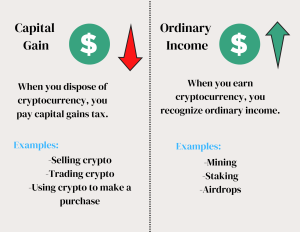Form 1099-B can make it easy to report your cryptocurrency capital gains — but it may contain inaccurate or incomplete information about your tax liability.

In this guide, we’ll cover everything you need to know about Form 1099-B for cryptocurrency taxes. We’ll explain what you should do if you receive Form 1099-B and discuss why Form 1099-B can lead to tax reporting issues for crypto investors.
Do I have to report crypto on my taxes?
Cryptocurrency is considered property by the IRS and is subject to capital gains and ordinary income tax.
What is Form 1099-B?
Form 1099-B is a tax form designed to track the disposals of capital assets. The form contains details about cost basis, gross proceeds, and capital gains and losses.
Like other 1099 forms, Form 1099-B is issued to taxpayers and to the IRS.
Stockbrokers like Robinhood and eTrade typically send out 1099-Bs for your stock trading activity at the end of the year. At this time, cryptocurrency exchanges are not required to send 1099-Bs to customers.
Do you get a 1099-B for cryptocurrency?
As of 2021, there hasn’t been explicit guidance around what 1099s cryptocurrency exchanges should provide to customers and the IRS. As a result, different exchanges take different approaches to tax reporting.
While some exchanges issue 1099-B to customers, most currently do not send tax forms detailing capital gains and losses to customers.
This will change in the near future. The Build Back Better Act included requirements for cryptocurrency brokers to report capital gains and losses to customers and the IRS.
 It’s not yet clear when mandatory 1099 reporting will go into effect. The IRS announced in December 2022 that these requirements would be delayed indefinitely.
It’s not yet clear when mandatory 1099 reporting will go into effect. The IRS announced in December 2022 that these requirements would be delayed indefinitely.
What tax forms should I receive from cryptocurrency exchanges?
Cryptocurrency exchanges may send you other versions of Form 1099 — such as Form 1099-MISC and Form 1099-K.
Does Coinbase issue Form 1099-B?
Like other major exchanges, Coinbase currently does not issue Form 1099-B to customers and the IRS. For more information, check out our guide: Does Coinbase Report to the IRS?
Which exchanges issue 1099-B?
Here are some popular exchanges that issued Form 1099-B to customers for the 2021 tax year.
Bittrex
BlockFi
Cash App
Robinhood
Uphold
Do I need to include 1099-B on my tax return?
There’s no need to attach Form 1099-B on your tax return, but you can use the information on the form to keep track of your capital gains and losses.
What happens if I don’t report 1099-B income to the IRS?
If you don’t report taxable income that’s been reported to the IRS on Form 1099-B, it’s likely that your tax return will be flagged automatically and you will be sent a warning letter about your unpaid tax liability.
Remember, all of your cryptocurrency disposals and income are required to be reported whether they are on Form 1099 or not. The IRS can often track your cryptocurrency transactions even if they are not mentioned on these tax forms.
How do I report cryptocurrency disposals?
All cryptocurrency disposals (including those reported on a 1099-B) should be reported on Form 8949, along with a description of the property, your cost basis and gross proceeds, and the date you acquired and disposed of your assets.
For more information, check out our guide to reporting your cryptocurrency taxes.
What happens if I didn’t get a 1099-B from my exchange?
You are required to report all your taxable transactions to the IRS regardless of whether your exchange sends relevant tax forms. Failure to do so is considered tax fraud.
Which crypto exchanges do not report to the IRS?
At this time, centralized exchanges like KuCoin and decentralized exchanges like Uniswap do not issue Form 1099-B or other tax forms to the IRS.
Still, it’s important to remember that not reporting your cryptocurrency income on your tax return can lead to fines, audits, and even potential jail time.
For more information, check out our guide to non-KYC exchanges.
Why does my Form 1099-B have incomplete/inaccurate information?
Transfers between different exchanges and wallets can lead to inaccuracies on Form 1099-B. In these situations, your cryptocurrency exchange might not have data on cost basis that’s needed to calculate your capital gains and losses.
For example, consider the following scenario.
This guide covers everything you need to know about Form 1099-B for cryptocurrency taxes, including why it can lead to tax reporting issues for crypto investors. Although Form 1099-B can simplify reporting your cryptocurrency capital gains, it may contain incomplete or inaccurate information about your tax liability.
If you’re wondering whether you need to report cryptocurrency on your taxes, the answer is yes. The IRS considers cryptocurrency property and subject to capital gains and ordinary income tax.
Form 1099-B is a tax form specifically designed to track the disposals of capital assets, including cryptocurrency. The form contains important information such as cost basis, gross proceeds, and capital gains and losses. Like other 1099 forms, it’s issued to both taxpayers and the IRS.
While stockbrokers like Robinhood and eTrade typically send out 1099-Bs for your stock trading activity at the end of the year, cryptocurrency exchanges are not currently required to send 1099-Bs to customers. However, some exchanges may send other versions of Form 1099, such as Form 1099-MISC or Form 1099-K.
It’s important to note that failure to report taxable income, whether it’s been reported on a 1099-B or not, can lead to fines, audits, and even potential jail time. Even if your exchange doesn’t issue a 1099-B, you’re still required to report all your taxable transactions to the IRS.
If you do receive a 1099-B from your exchange, you don’t need to attach it to your tax return, but you can use the information on the form to keep track of your capital gains and losses. You should report all cryptocurrency disposals, including those reported on a 1099-B, on Form 8949, along with a description of the property, your cost basis and gross proceeds, and the date you acquired and disposed of your assets.
It’s worth noting that different exchanges take different approaches to tax reporting, and as of 2021, there hasn’t been explicit guidance around what 1099s cryptocurrency exchanges should provide to customers and the IRS. While some exchanges issue 1099-Bs to customers, most currently do not send tax forms detailing capital gains and losses to customers. However, the Build Back Better Act included requirements for cryptocurrency brokers to report capital gains and losses to customers and the IRS, although it’s not yet clear when mandatory 1099 reporting will go into effect.

